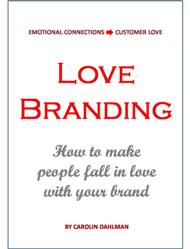Love Branding
 Review – Love Branding: How to make people fall in love with your brand by Carolin Dahlman
Review – Love Branding: How to make people fall in love with your brand by Carolin Dahlman
Carolin Dahlman has two professions: branding expert and “love coach.” While these two callings seem unrelated at first glance, Dahlman thinks they fit together perfectly. In her book, Love Branding, she shows how marketers can achieve branding success by understanding how humans relate to each other.
Bringing in love to your business plan does not mean you have to be a hippie. The times of being a cold Gordon Gekko are over for sure – I think you agree with me on that – but I’m not saying that you have to be like Mike Myers in the move “The Love Guru” either. Love is more “normal” and “business-like” than you might think. If you can learn to master your customers’ emotions and make them feel the love, you will earn more money. [From Love Branding.]
One might expect a book comparing brand relationships to human love would be full of fluffy anecdotes about romantic misadventures and speculative analogies to brand building. While there are indeed a few love coaching stories sprinkled around the book, they aren’t the main emphasis. In fact, Dahlman populates this slender (182pp) but interesting volume with over a hundred end-noted citations as well as her own branding observations from both personal experience and consulting gigs. Long-time Neuromarketing readers will find some of the research to be familiar, but Dahlman provides her own insights and “brand love” perspective.
One key point Dahlman makes is that all too many brands exhibit that all-too human failing of expecting their partner to love them without offering their own love first. Consumers don’t want to be told that they will love a brand, or should love that brand. Rather, they want to be loved BY the brand.
Don’t just focus on THEIR love for YOU, but also show you care for every customer by giving, giving, giving. Don’t open a fan page on Facebook just to market yourself. Open a page to serve.
Some of Dahlman’s chapter titles include, “Catch their eye,” “Flirt and Attract,” “Build emotional connections,” “Keep love alive,” and “5 errors lovesick brands make.”
Love Branding, published privately in Australia, hasn’t received much attention. That’s too bad. Even if one finds the analogy to human love a bit of a stretch, the references and branding examples that Dahlman has collected are highly worthwhile. Unfortunately, one can’t just pop on Amazon to get a copy; it’s available only from Dahlman’s own site. Watch this space: in coming posts – I’ll share a few more of Dahlman’s insights. And, for Dahlman’s view on linking love and branding, see the video below:
